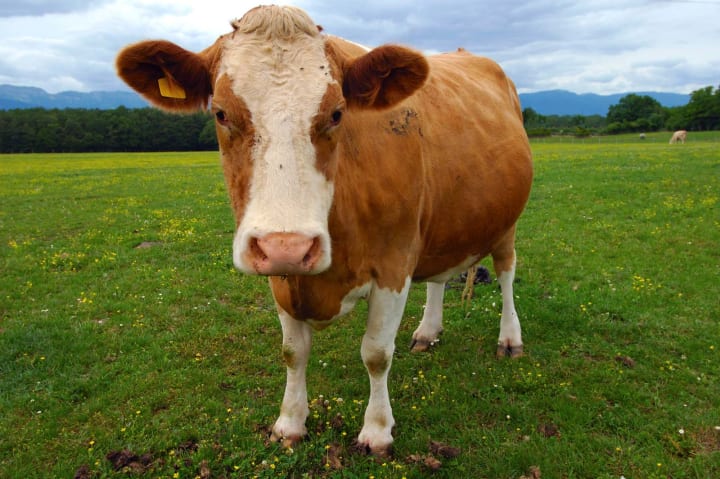Reflections of a Rational Vegan
I'm not a regular vegan, I'm a cool vegan

Before we kick this off let me be clear on a few things:
1. This is NOT vegan indoctrination propaganda
2. I am not going to shy away from reality (don’t worry - no slaughterhouse videos here)
3. This is just my personal opinion
Well now that that’s out of the way, I just want to share the events that led to my veganism and the motivation behind my decision to not eat meat.

This whole plant-based process started back in 2018. Prior to that, I had spent 26 years of my life consuming animal products and had no plans to stop. I was a college athlete, subscribed to the massive protein GAINS mentality and would mock the Meatless Monday campaigns all over social media. Don’t get me wrong, I still ate my vegetables and was incredibly healthy, but I had never for a moment considered what it would mean to go plant-based. My family ate meat, my friends ate meat and we were all healthy, so why would we stop?
Fast forward to 2018, and the Farmer Nick business was starting to take root. I was fully invested in the world of plants and was rapidly expanding my environmental knowledge and perspective. Plants were the stepping stones I needed to start caring more about the environment, and one day another environmentalist friend suggested that I watch Cowspiracy on Netflix. Going into it I had no intention of changing my diet, and I knew the doc would certainly have an element of sensationalism to accommodate their vegan agenda, but I walked away with two irrefutable facts:
1. The raising of animal products has a negative impact on the environment
2. Animals are harmed in the process

No one can deny these two points, and anyone who does should read this article from the New York Times and look at the animal consumption stats from the World Economic Forum.
That night I lay in bed questioning my dietary decisions. I was already healthy, but the environmental impact and animal cruelty factors were weighing on me. They simply did not align with my ethos and were in direct competition with the person I wanted to be.
How can I say I care about the environment and love animals when my actions say the opposite?
Environmentally, there were many things I could do to offset my emissions and lower my carbon footprint (fly less, drive an electric car, reduce plastic, etc.). But the animal question is binary. No matter how humanely an animal is raised, the end result is the same, and if I couldn’t kill a cow myself, what gives me the right to eat it?
It was never about health for me, and environmental and animal justice reasons powered my decision to take the leap. Health was a distant third but that doesn’t devalue the efforts of “health-motivated” vegans.
I was committed to making the change and intrinsically motivated to go all in, but it still took me some time before I became 100% vegan. Like any significant behavior change, it requires micro steps and a gradual process, and here are the progressions I made during my three year transition:
The Vegan Experimenter - All vegan meals during the week with no restrictions on the weekends (January 2018 - July 2018)
The Vegan Cheat Meal Guy - All home-cooked meals are vegan with no restrictions if I went out to eat (July 2018 - December 2018)
The Socially Convenient Vegan - All home-cooked meals are vegan with a pescatarian / vegetarian diet if I went out to eat (January 2019 - March 2019)
The International Exception Vegan - All meals are vegan unless I am traveling in a different country (April 2019 - December 2019)
The Full Time Vegan - All meals are vegan (January 2020 - Present)
And here I am one year later. I haven’t withered away, I get more than enough protein and no animals were harmed in the making of this body ;)

I recognize that this switch isn’t for everyone, and I know how intimidating vegan messaging can be. In fact, I myself have issues with the vegan movement because it can be too “all or nothing” and overly combative in its syntax, so I’m hoping we have discovered a middle ground here. At the very least, I hope that you take a moment to pause and acknowledge the realities of our food system:
Raising animals has an environmental cost and those animals will eventually be killed. It isn’t perfect and it intentionally keeps you in the dark, but there are a few things we can do to make the transition easier.
IF YOU ARE GOING TO EAT MEAT…
Buy the highest quality, grass fed meat you can find. The price tag may be higher, but a) the taste will be better b) it is healthier for you and c) maybe you’ll eat less meat because it is more expensive. I’d rather you spend more on healthier meat that is produced by animals that were at least treated “better” than factory-farmed trash that is pumped full of antibiotics. (This is why I have a tremendous respect for hunters who hunt to feed themselves. Could I do it myself? No way, but I respect it).
Here are four tips for those that want to start eating more plant-based:
Find Your Vegan Restaurants
Happy Cow is a great resource for identifying reviewed vegan restaurants near you. Some cities like LA and NYC are certainly more vegan friendly than others, but Happy Cow can come through with some clutch recommendations when you're in a pinch. You should also tell your non vegan restaurants how much you appreciate their plant-based options. That anecdotal feedback will work its way up the food chain and encourage the restaurant to keep at it.
Improve Your Cooking Skills
Lack of time, recipe inspiration and cooking skills are three reasons why people struggle to make the jump to a plant-based diet, but learning from real chefs will not just make you a better chef, it will cut down on your cooking time as well. Sign up for a virtual cooking class and make sure to not skip out on the basics like knife skills. Believe me… watching my roommates try to cut a butternut squash was both comical and sad.

Create a Vegan Transition Plan
You don’t have to make these changes overnight. Here is a sample timeline you can use if you want to become 100% vegan in one calendar year.
Weeks 1-5: One vegetarian day per week
Weeks 6-15: Three vegetarian days per week
Weeks 16-25: One vegan day per week
Weeks 26-35: Three vegan days per week
Weeks 36-45: Five vegan days per week
Weeks 46-52: Full Time Vegan
Find Vegan Role Models
It’s 2020… the world may be crumbling around us but not for a lack of amazing vegan chefs. Hit up Instagram and make sure to follow these five badass chefs who make some of the most delicious FOOD I have ever tasted.
Nisha Vora (@rainbowplantlife)
Max La Manna (@maxlamanna)
Jenne Clairborne (@sweetpotatosoul)
Priyanka Naik (@chefpriyanka)
Timothy Pakron (@mississippivegan)

About the Creator
Farmer Nick
Nick Cutsumpas
@farmernick on Instagram
Plant Coach + Urban Farmer 🌱 LA | NYC📍
Plants = regenerative stepping stones 🌍







Comments
There are no comments for this story
Be the first to respond and start the conversation.